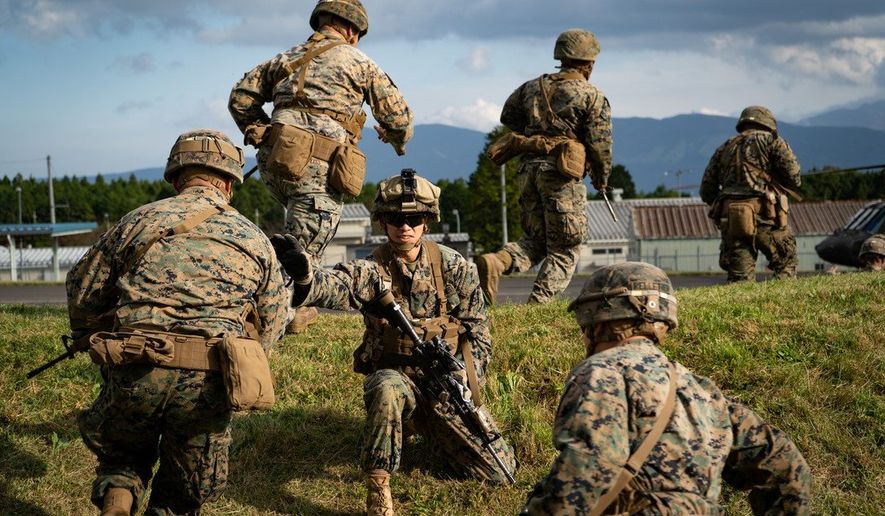The push to eliminate all gender segregation at Marine Corps camps has more momentum than ever, but analysts and military insiders say there remain major real-world, physical roadblocks to coed basic training and serious questions about whether the Marines can or should follow the lead of the Army, Navy and Air Force.
The Marine Corps last month reportedly commissioned a comprehensive study to examine the benefits and potential pitfalls of moving to more integrated training of male and female Marines.
The report assumes that men and women would still be kept apart during their first few weeks of training and remain in separate platoons but underscores how the militarywide movement away from most types of gender distinctions has reached the Marines.
The Army in recent years has allowed women to serve in combat roles traditionally reserved for men. The Army, Navy and Air Force have held integrated basic training for decades. The Marine Corps remains the only service to separate male and female recruits during early weeks of service.
Proponents of integration argue that separating men and women is an archaic practice that sends a message of exclusion and suggests that women can’t play equally important roles as men in defending the nation.
Critics argue that it is simply unrealistic to hold all men and women to the same set of stringent physical standards needed for basic training. They point to reports of women failing the Army’s latest physical fitness test at a much higher rate than their male counterparts.
Some retired Marine Corps officers told The Washington Times that establishing fully gender-blind camps, subsequently holding women to the same physical standards as men, would deliver the same results as the Army’s fitness test or perhaps more drastic gaps in performance.
Even the most ardent proponents of integration say the Marine Corps leadership already has decided that coed training is wrong.
“I would be absolutely shocked if they didn’t reach the foregone conclusion that integrating boot camp would be negative to the Marine Corps,” retired Lt. Col. Kate Germano, a 20-year Marine Corps veteran, told The Times.
“Rather than invest in another study about whether or not the Marine Corps legacy will be disrupted [by integrating basic training], maybe we should be studying the value women present to the military instead,” she said. “Our national security is potentially at stake.”
Col. Germano’s last assignment was commanding the all-female 4th Recruit Training Battalion at Parris Island, South Carolina. Although relieved for allegedly allowing a hostile work environment in the unit, she said her superiors never supported her goal of holding female Marine Corps recruits to the same standards as male recruits.
In a statement to The Times, a Marine Corps spokesman said the service is “always seeking to improve” itself. The spokesman said the Marine Corps is integrated at the company level for entry level training and “seeks to maximize these opportunities when it makes sense in relation to shipping cycles, personnel and facilities.”
The spokesman said the Marine Corps plans to have eight integrated companies conducting entry-level training at Parris Island by the end of the fiscal year in September.
Integrated companies consist of platoons that remain separated by gender, but Marine Corps officials say the growing number of coed companies underscores their effort to keep men and women together as much as possible during the 13-week training regimen.
Such steps toward integration are too slow for some lawmakers. Rep. Jackie Speier, California Democrat, introduced legislation this summer that would prohibit the separation of men and women at Marine recruiting depots.
Other Democrats, including Marine veterans, said in interviews that the idea should be explored. But they also conceded that the Marine Corps, with its historically high training standards and intense set of physical demands on recruits, will prove harder to integrate than other branches of the military.
“The Marine Corps is largely an infantry organization, and the infantry organizations have always been resistant to integrating women into it,” said Rep. Ruben Gallego, Arizona Democrat and Marine Corps veteran. “So I think it’s been in other armed forces [branches] they’ve been so used to working with women in different parts of the military that it was much quicker for them to integrate into this. I think this is probably the final block, and I think they’ll find — like I saw when I did go on patrol with female Marines — that [women will be] as capable as any other Marine.”
Supporters of more integrated training often make a similar point: In the field, women have proved to be as useful and reliable as men. Personal anecdotal experiences are just one piece of the equation, though. The latest Marine Corps study will dig much deeper into the concept of gender and military training.
The analysts are expected to use data and research dating back to the 1990s or perhaps even earlier. Critics of the looming report say such an approach is flawed because many factors dealing with women in the military have changed, including the perception of physical and mental capabilities.
“There is a concern about how the Marine Corps is framing how they want the study directed,” Col. Germano said. “But this wouldn’t be the first time.”
Other retired Marine Corps officers said factors beyond physical performance should be examined. For example, they said, some female drill instructors enjoyed having “their own world” where they did not have to compete with men for power and position.
• Mike Glenn can be reached at mglenn@washingtontimes.com.
• Ben Wolfgang can be reached at bwolfgang@washingtontimes.com.




Please read our comment policy before commenting.